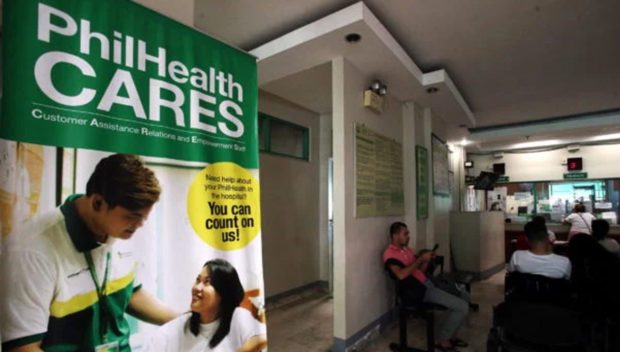
FILE PHOTO: PhilHealth office
MANILA, Philippines — The House committee on health has pressed the Philippine Health Insurance Corporation (PhilHealth) to reconsider and defer its circular suspending payments of hospital claims.
During the grueling five-hour hearing on PhilHealth’s implementation of the Universal Health Care Act and its temporary suspension of payment of claims (TSPC) on Tuesday, Nueva Ecija 2nd District Rep. Estrellita Suansing made a motion urging the state insurer to review its move.
Suansing was referring to PhilHealth’s Circular 2021-0013 which includes additional provisions to strengthen its previous policy in TSPC — responsible for the suspension of hospital claims payments to avoid further losses in income.
“Madam chair, I don’t think that this is the right time, this is not the right time to come up with a circular and therefore I would like to suggest if my colleagues will agree, to suspend this circular,” she told health committee chair and Quezon 4th District Rep. Angelina Tan.
“I move that the committee strongly urge the PhilHealth to review and possibly suspend the Circular No. 2021-0013 without prejudice to any legislative remedy or measure that may be filed by this honorable committee,” she added, which was immediately seconded by the committee members.
The PhilHealth order centers on its desire to minimize allegedly fraudulent claims or hospital requests for payment that it believes is laden with irregularity.
Previously, PhilHealth would just notify healthcare providers and institutions about its problematic claims. But now with the TSPC, PhilHealth can stop paying hospitals which are undergoing investigation to avoid the loss or waste of funds.
If a hospital or a medical facility fails to answer within three days or if its explanations lack merit, investigators may recommend a notice of TSPC. In the past, healthcare providers in question can reply within 10 days.
READ: PhilHealth tightens rules on claims to stop further losses
But while Suansing and other committee members have acknowledged that it might be a good initiative to ensure the viability of PhilHealth, they have also insisted that it might not be the perfect time to implement such a measure as the country still grapples with the COVID-19 pandemic.
According to lawmakers, a simple disallowance of claims payment may have a negative impact on the hospitals’ provision of services.
Representatives of medical organizations also referred to the TSPC as the proverbial whip that would be used on a tired and weary carabao — hospitals and healthcare workers — that is toiling the land.
“Hindi po ba pwede na every time you come up with a circular you have to consult them? […] Alam po ninyo hindi naman ako concerned dito no, pero no’ng binasa ko po talaga ito parang nalungkot po talaga ako in behalf of the health professionals and owners of hospitals no,” Suansing noted.
“It’s a pandemic, Madam chair, alam mo kapag marami ang mga hospitals that will close, Diyos ko, ano ang mangyayari sa Pilipino, sa mga tao, sa mga constituents natin, sa buong Pilipinas?” she asked.
Prior to Suansing’s outburst, other lawmakers including Marikina 2nd District Rep. Stella Quimbo also condemned the inability of PhilHealth to look at better implementation and investigation instead of immediately resorting to claims payment suspension.
READ: Quimbo on halt to PhilHealth claims: Probe fraud, not suspend payments
PhilHealth has been justifying its move to update the circular, saying it would ensure proper fund management and fraud control — the reason as to why the House panel vowed to address the issue as several hospitals have already vowed to reconsider their ties with the state insurer as the circular conveys a feeling of being mistrusted.
RELATED STORIES
House panel to mediate talks between PhilHealth, hospital group
Hospital groups rethink PhilHealth ties after circular conveys ‘mistrust’